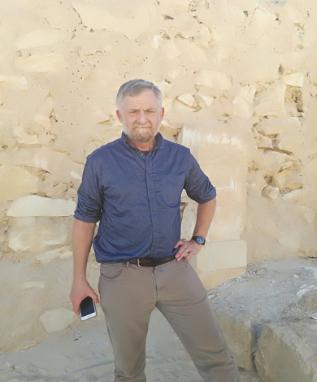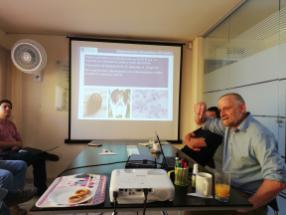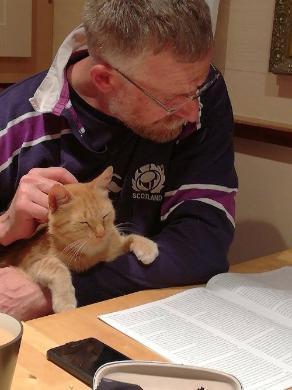Researcher spotlight : Nick Jonsson
Published: 13 May 2019
This week, Elle Lindsay puts Professor Nick Jonsson under the Spotlight. Professor Jonsson tells us about his work as a veterinary practitioner in Australia and his subsequent career path!
 Tell us about your background.
Tell us about your background.
I graduated as a vet in Sydney in 1987 and went to work as a mixed veterinary practitioner. I owned a small farm in rural NSW (New South Wales) and co-owned a mixed practice for a while before deciding that I needed more mental stimulation and less time-associated stress. I found that it was pretty hard to deal with the pressure of getting to my booked-in calls on time: there were always extra cows a farmer gave you to check “while you’re here”, along with sporadic emergency cases, and then the need to get back to the surgery to do work-ups on your small animal cases (which really should have been treated hours previously). Anyway, I did a PhD at the University of Queensland, broadly on the effects of heat stress, hypocalcaemia and genetic merit of cattle on the timing of resumption of cyclic, postpartum ovarian activity. It was not a very tightly focused PhD, but it was interesting, and I had the opportunity to work with lots of industry stakeholders. This led to my first research job: working for Queensland Government, after just 18 months of working on the PhD. From that point, I had to finish the PhD in my own time. Fortunately, the work of my department was well-aligned with my remaining PhD work, so it was all finished up in 4 years. After this governmental job, I spent a couple of years as a lecturer at Glasgow, but then returned to University of Queensland for 10 years. During the 10 years at UQ, I had various academic management roles and we established a new research institute that was a collaboration between my former government department and the University. I moved back to Glasgow in 2009, first into the School of Veterinary Medicine (SVM), where I was leading the farm animal clinical group.
Why did you decide to come to IBAHCM?
With the restructure in 2010, I initially remained within the SVM, but was subsequently shifted into IBAHCM, primarily because I was research active. However, I also have many overlapping research interests with IBAHCM staff.
What is your main role within the institute currently?
My research falls within the Institute’s remit, and I teach a diverse range of subjects (genetics, nutrition, metabolic diseases, parasitology) in the BVMS programme and in PGT programmes – Wildlife and Livestock Management, and Food Security. I coordinate 3 courses within Wildlife and Livestock Management. One of my main roles is to support the research work of farm animal clinical academic staff in the School of Veterinary Medicine.
What part of your current work have you enjoyed the most/felt most proud of so far?
Although my favourite among my day-to-day activities is playing with data, I enjoy running projects, whether they are externally funded research projects, contract clinical trials, or simply regeneration projects for my teaching material. Anything where I can set objectives, make plans and then implement them. I enjoy these things. In relation to what I am most proud about, my various collaborators and I have done some nice research on cattle ticks – particularly the genetics of their resistance to acaricides (pesticides that target the arachnid Subclass Acari) and the genetic basis of resistance of cattle to the ticks. We discovered some mutations that confer resistance to synthetic pyrethroids (a family of pesticides) and others that confer resistance to amitraz (also a pesticide). These discoveries were internationally very important. I am particularly enjoying working with RSPB on the interaction between parasite management in cattle and the protection of avian feed resources (for example, see this paper https://www.nature.com/articles/s41598-019-40800-6). Although somewhat in the past, I was also particularly happy when some beautiful immunofluorescent images from our project on tick feeding were used on the cover of two journals.
Have you come up against any unforeseen challenges?
Reflecting on this question, it occurs to me that all of the challenges that I have encountered should have been, at least to some extent predictable. In some respects my greatest challenge, and one that I have not managed as well as I could, has been that my interests are very broad, so I have struggled to differentiate between those opportunities that I must take and those that I could probably leave.
What is your key research interest?
I am particularly interested in reconciling the requirements of ensuring high levels of livestock health and production with sustainable environmental management. In particular, with many of our current models of livestock production there can be a need for concentration of animals in limited spaces, with high levels of veterinary drug use, and high levels of cereal as supplementary feeding. How do we protect the interests of livestock and farmers without compromising ecosystems services? This research interest leads me to work in diverse areas, including animal genetics, parasitology, drug resistance in parasites, metabolic diseases and nutrition.
Are you where you thought you would be 5 years ago?
More or less. I am enjoying my work more than at any time in the past 10 years. I have a good mixture of work in industry, as a consultant, with teaching and academic research. It is very rewarding and I have learnt to manage some of the stresses that come from competing demands in academia.
What are the most important lessons you have learnt from your previous work?
- Creativity is necessary for good research and teaching but without committing appropriate time and financial resources, and without discipline, it is not sufficient.
- Effective time management skills are essential. I find it helpful to think of my work as a series of projects, each with its own budgeted time and effort.
- Working outside your discipline and out of your comfort area is a great stimulus for creativity. However, outside your core area, great effort is required to make sure that you become aware of relevant literature.
- Collaborations are deals and in my experience they work best when they are symmetrical, when communication is open, profuse and honest, and when all partners understand exactly what benefits they stand to gain from the deal and when they gain them.
- Collaborators are people. Their priorities, outlook and circumstances all change over time. To have a good partner in research is possibly the best asset you can have, but like any relationship, it involves work and understanding. From time to time you must be prepared to demonstrate your altruistic, collegiate credentials.
- There is nothing to be gained from deprecating the work of colleagues, but deprecation is very distinct from constructive criticism, from which it is important not to shy away.
If you could tell your PhD-self one thing, what would it be?
Nothing, really. My PhD-self did fine without my advice, which is generally a bit suspect.
Can you tell us about your plans for the future?
This is a more challenging question. I am working with a livestock nutrition company. We are starting a residency programme and have a 4-year research plan. I also have a project in Colombia, in support of sustainable livestock production systems. We wish to do some more work on acaricide resistance genetics in ticks and other arthropods (particularly dung beetles), as markers of exposure to faecally-excreted parasiticides. We are working on the parasiticide and arthropod wildlife story some more. I would also like to do a postgrad degree in the humanities – philosophy and formal logic. As well as that, I really want to improve my understanding of probability and get better at longitudinal data analysis.

First published: 13 May 2019

